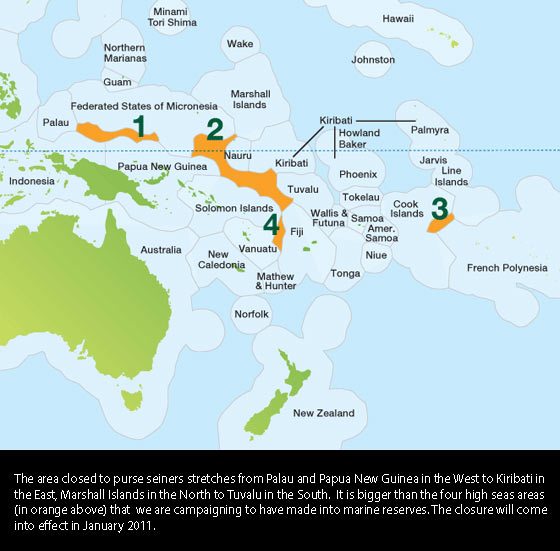We’re even closer to saving the oceans in the Pacific from overfishing.
Earlier this year we were delighted by the closure of two massive high seas areas to destructive purse seine fishing. Now we are getting really excited. Eight Pacific Island countries have just announced they’ll close a whopping 4.5 million square kilometres of ocean to purse seine fishers. This is an important step towards establishing marine reserves that will protect ocean life from overfishing.
The area that is being closed includes, but is even bigger than, four areas that we want turned into marine reserves (in orange below). In October we’ll be taking our campaign to the UN. We’ll ask it to protect these areas and declare them marine reserves.

Currently there is little control exerted over fishing in this area and fleets from Asia, the EU and the US are free to plunder it for tuna. Scientists warn that if fishing isn’t brought under control, tuna stocks will plummet and the fishery may collapse. That would leave Pacific communities without a vital source of food and income.
The decision to close these areas to purse seiners is a historic step forward. Pacific Island Countries have united to conserve their precious marine resources, making them international leaders in marine conservation.
Overfishing worldwide
Greenpeace has exposed overfishing, pirate fishing and also wasteful fishing in the Pacific. This video provides an overview of the issues facing these important ocean areas.
Overfishing isn’t only occurring in the Pacific region. Massive wasteful fishing fleets are overfising the oceans across the globe. This is the subject of the upcoming documentary ‘The End of the Line’. It documents the true impact of modern fishing on people and the environment and how we can address it.
One of the solutions that the ‘The End of the Line’ explores is the establishment of marine reserves to allow our depleted oceans to recover.
Greenpeace has been vigorously campaigning for the closure of these high seas areas in the Pacific to purse seine and long line fishing and for them to be established as marine reserves.
If you’re hungry to learn more and be a part of the growing movement to protect our oceans, come and see ‘The End of the Line’. It’s showing for a limited season across Australia from Monday 10 May. Some screenings will have fascinating Q&A panels with marine biologists and conservationists.


